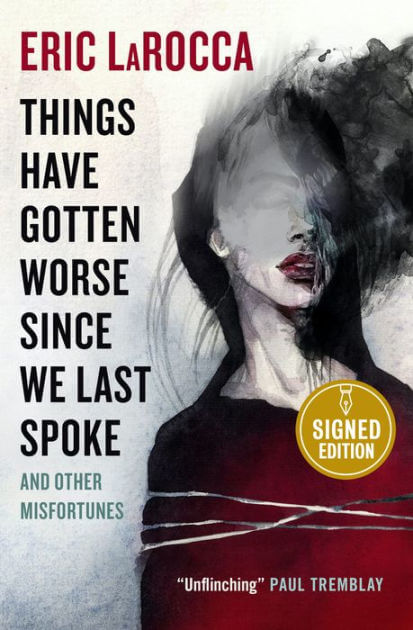Things Have Gotten Worse Since We Last Spoke and Other Misfortunes Book Summary
“Things Have Gotten Worse Since We Last Spoke and Other Misfortunes” by Eric LaRocca is a rollercoaster of emotions that takes you through the complexities of human connection, obsession, and the unexpected turns life can take.
The story revolves around two characters, Isabella and The Voice, who engage in an online conversation that gradually transforms into a surreal exploration of their inner demons. The narrative is presented as a play, with each character’s lines contributing to the unfolding drama.
Isabella, a young woman with a troubled past, seeks solace in the anonymity of the internet. On the other hand, the Voice is a mysterious and unsettling presence that inserts itself into Isabella’s life with eerie persistence. The exchanges between the two characters are laced with tension. As the story progresses, the lines between reality and delusion become increasingly blurred.
LaRocca weaves a poetic and disturbing narrative, using the online conversation as a canvas to paint a portrait of isolation and desperation. The language is rich with symbolism and metaphor, creating a haunting and thought-provoking atmosphere. The use of simple words doesn’t diminish the impact of the storytelling; instead, it enhances the accessibility of the narrative, allowing readers to immerse themselves in the characters’ struggles without getting lost in complex language.
One of the book’s central themes is the fragility of human connections in the digital age. Isabella and The Voice, despite their virtual interaction, grapple with real and raw emotions. The story delves into the vulnerability of opening up to someone, even if that someone exists only in the digital realm. It explores the power dynamics that unfold in online relationships and the consequences of seeking companionship in the vast expanse of the internet.
As the title suggests, “Things Have Gotten Worse Since We Last Spoke” reflects the progression of events and the inevitable descent into chaos. The narrative unfolds in misfortunes, each more unsettling than the last. The simplicity of the language contrasts with the complexity of the emotions at play, creating a disturbing and immersive reading experience.
Isabella’s character is a poignant exploration of trauma and how individuals cope with their past. Through her interactions with The Voice, readers witness the unraveling of a troubled soul, laid bare in the stark simplicity of the online conversation. LaRocca captures the essence of human suffering with a resonant rawness, making Isabella a compelling and relatable protagonist.
The Voice, shrouded in mystery, serves as a manifestation of the darker aspects of human nature. Its presence is both a source of comfort and torment for Isabella, highlighting the duality of human relationships. The simplicity of the dialogue between Isabella and The Voice adds to the enigmatic nature of their connection, leaving readers to grapple with the ambiguity of the character’s motivations.
The book’s format as a play adds a unique layer to the storytelling. Using dialogue as the primary narrative device creates an immediacy that propels the story forward. The absence of descriptive prose allows readers to fill in the gaps with their interpretations, making the experience more immersive. The simplicity of the language in the play format enhances the theatricality of the narrative, inviting readers to visualize the unfolding scenes in their minds.
The story’s pacing is relentless, with each exchange between Isabella and The Voice building tension and anticipation. The simplicity of the language doesn’t hinder the narrative’s ability to create a sense of urgency and unease. It enhances the impact of key moments, allowing the weight of the words to resonate with the reader.
One of the strengths of “Things Have Gotten Worse Since We Last Spoke” is its ability to tackle complex themes with a deceptive simplicity. The exploration of trauma, obsession, and the blurred lines between reality and fantasy is masterfully woven into the fabric of the narrative. The use of simple words doesn’t dilute the depth of the subject matter; instead, it invites readers to engage with the themes on a visceral level.
The book’s title is a recurring motif throughout the narrative, a constant reminder of the inevitability of worsening circumstances. As Isabella and The Voice navigate the intricacies of their virtual relationship, the ominous undertones of the title become increasingly pronounced. The simplicity of the language in conveying this theme adds to the foreboding atmosphere, creating a sense of foreknowledge that lingers throughout the reading experience.
Quotations from the book are like breadcrumbs leading readers deeper into the labyrinth of the narrative. Each line carries weight and significance, contributing to the overall tapestry of the story. The simplicity of the language in these quotations doesn’t diminish their impact; instead, it amplifies the emotional resonance, allowing readers to connect with the essence of the characters’ experiences.
In conclusion, “Things Have Gotten Worse Since We Last Spoke and Other Misfortunes” is a compelling exploration of human connection, trauma, and the unpredictable nature of life. Eric LaRocca’s use of simple words doesn’t compromise the complexity of the narrative; instead, it invites readers into a world where the starkness of language mirrors the rawness of emotion. The play format, the enigmatic characters, and the thematic depth make this book a haunting and unforgettable reading experience.
